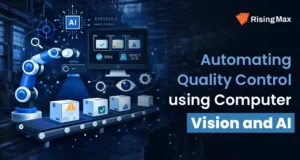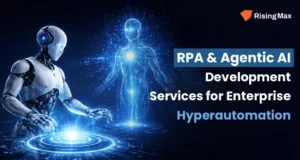The way we interact with technology has made AI instrumental in various industries. Financial market participants, such as insurance companies, hedge funds, banks, and pension funds, actively analyze ways to leverage AI, while private equity (PE) firms are no exception.
The prediction says global AI size will expand at a compound annual growth rate (CAGR) of 37.3% from 2023 to 2030, reaching $1,811.8 billion by 2030. The growing AI size is revolutionizing three major areas that exhibit a significant ROI for AI among private equity firms. Those areas are investment pre-screening, risk intelligence, and deal flow.

Some private equity firms have gradually invested in their data and analytics abilities for the past two decades. They set themselves to capture the unparalleled opportunities presented by the emergence of generative AI. It can revolutionize the investment cycle for PE, from driving efficiencies to establishing new businesses and from fund-raising to exit planning.
However, some investors explore data mining to map performance, trends, and market sentiment to identify businesses ready for equity investment. Monitoring web traffic, app downloads, domain authority, social media activity, and media footprint illustrates traction. AI algorithms help establish patterns and correlations, filtering through ample structured and unstructured data to rank organizations.
In this blog, learn about myriad applications and use cases of AI in private equity, along with exploring the transformative impact of AI on it.
Challenges Faced by Private Equity
Private equity faces challenges such as intense competition for attractive investment opportunities, economic uncertainties impacting portfolio companies, regulatory changes affecting deal structures, and the need to generate consistent returns amidst market fluctuations. There are many more in the queue, discussed below.
- Mutual Data Analysis: Private equity firms mostly rely on manual processes to evaluate large amounts of data, which is prone to errors and time-consuming. It includes sifting through market research, financial statements, and other valuable information to reckon investment possibilities.
- Feeble Lead Generation: Analyzing potential investment sometimes takes time and effort. The manual function lacks evaluation from different sources at an appropriate time, identification of suitable investment targets, and personalization of outreach efforts.
- Limited Predictive Insights: Companies may need help to predict investment performance, market trends, and risk factors. They are unable to analyze historical data and identify patterns for informed investment decisions.
- Risk Management: Evaluating and monitoring risk is a significant aspect of investment. Firms may depend on traditional risk assessment techniques, which are ineffective in predicting and mitigating risks associated with difficult investment scenarios.
- Operational Inefficiencies: Private equity firms look for solutions to encounter operational inefficiencies, such as diverse portfolios and managing large, ensuring regulatory compliance and internal processes. It is essential to streamline these operations by automating routine tasks.
- Complicated Due Diligence: Due diligence is necessary in the investment process. Firms manually review documents, assess financial data, and execute background checks, making the process time-consuming and lengthy.
- Hassle in Assessing Market Sentiment: Understanding market sentiment is crucial for creating informed investment decisions. Companies need to rely on manual methods to evaluate social media, news articles, and other elements of market sentiment, which can take time and more resources.
- Portfolio Monitoring and Reporting: Private equity must monitor their portfolios and report to stakeholders. This process includes manually aggregating data and creating reports that can be prone to errors and time-consuming.
AI Edge of Conquering Private Equity Challenges
In the dynamic landscape of private equity, the integration of AI has emerged as a transformation force, offering innovative solutions to longstanding challenges. AI is reshaping the private equity sector, revolutionizing data analysis, automating key processes, and ultimately conquering hurdles that have traditionally hindered optimal decision-making and portfolio management. From swift identification of investment opportunities to sophisticated risk assessment, AI is poised to redefine and elevate efficiencies of private equity practices.
Here’s how:
- Data Evaluation: AI is helpful for investors to evaluate financial and non-financial data, generate predictive models, and identify patterns to enlighten their investment decisions. Firms with AI can process large volumes of unstructured data efficiently, attaining valuable insights to reinforce their investment decisions.
- Investment Screening Automation: AI has the power to automate the investment screening process in private equity. It conducts comprehensive due diligence by filtering through large volumes of data, including market research, financial statements, and relevant documents, building a smooth process. Further, AI helps secure deals, develop structures, and perform in-depth industry analysis.
- Lead Generation: Private equity firms utilize AI for lead generation and analyzing data from sources such as company websites and LinkedIn. AI can draft tailored emails demonstrating interest and knowledge in the target companies. With optimized inbox placement, these personalized emails are more likely to reach decision-makers effectively, increasing the likelihood of successful engagement with investment targets.
- Enhancing Exit Strategies: With AI that optimizes exit strategies, recognizing the right timing and exiting investment routes are easy. Its ability to analyze insights and market trends allows firms to make well-informed decisions regarding their exits.
- Improving Operations in Portfolio Companies: AI technologies improve operations in portfolio companies. Private equity firms can push AI adoption across their portfolio companies in the future while they are currently addressing their internal AI needs.
- Growing Interest in Concept Projects: The availability of large language models to the public has increased interest in AI within private equity companies. Many of them analyze AI and work on proof of concept projects to test the technology’s potential in improving their investment outcomes and operations.
- Protecting Proprietary Data Behind Firewalls: AI adoption effectively addresses such issues. The industry is discovering solutions such as risk governance and synthetic data generation for more implementation of AI tools.
Looking to Automate Your Private Equity Process?
From ideating your investment strategy to optimizing it, our AI development maestros assist you with every process step. Reach us now!
Use Cases of AI in Private Equity
AI revolutionizes private equity by enhancing decision-making, risk assessment, and operational efficiency. Predictive analytics helps identify lucrative investment opportunities, while machine learning models analyze vast datasets for market trends. Automation streamlines operational costs and routine tasks. AI-driven insights empower private equity firms to make informed decisions and stay competitive in dynamic markets. Understand it through use cases of AI in private equity, discussed below:
Use Case 1: Deal Sourcing
PE firms maintain better relationship networks and excellent market intelligence operations. They constantly contact prospective companies before others. AI can be a game changer for transforming an organization’s market intelligence.
PE firms must solve the problem of identifying the best prospective deals, which involves searching public data sets and using search engines. These firms leverage AI technologies such as NLP to help analysts grab accurate information and eradicate irrelevant information. Further, they use generative AI to restate it for easy consumption. It significantly improves their deal flow compared to their peers who have yet to start with it.
Use Case 2: Pre-screening
After identifying an investment opportunity, PE firms must understand the company’s operations, personnel, and competitive landscape. It is where AI comes into the picture that helps them take action before it’s too late. Sometimes, PE analysts can quickly recognize reasons to pursue a deal only after burning more resources and time. They can emphasize the most promising opportunities and avoid unnecessary investments.
The initial phase of due diligence on the organizations involves non-financial information analysis, where teams often find them overloaded. Thus, AI technologies, such as NLP and generative AI, help PE firms conquer the information-overloaded problem to cover more research ground and work smarter.
Use Case 3: Risk Intelligence
Reputation is one important aspect for PE firms. A public controversy can incur serious damage to it. However, controversy monitoring is challenging. International company operations have moving parts to keep track of, facing more risks than ever. Customers, governments, and the public closely scrutinize company behavior, particularly on environmental, social, and governance (ESG) factors.
Efficient risk intelligence includes processing vast amounts of unstructured information, including lawsuits, news coverage in local languages, regulatory actions, and ever-changing regulations, while generating actionable insights. The task complexity has far outstripped the analysis capability to manage. However, generative AI and NLP are useful because they streamline information daily and understand sentiment, criticality, and relevance. PE firms using AI have better outcomes without any catastrophes.
Use Case 4: Portfolio Management
Examining the performance of each portfolio is an imperative but challenging task, though PE firms handle multiple portfolios. AI helps monitor KPIs and identify trends and patterns that may indicate a need for intervention. It is easy to analyze financial data by programming an AI system from a portfolio company and enlightening the private equity concerning trends, including rising expenses or falling sales. It helps predict how a pandemic might affect an industry by evaluating how COVID-19 impacted it under similar circumstances.
Applying AI in portfolio management assists PE firms in making better-informed decisions regarding resource allocation and their performance. It can enhance risk management and decision-making.
Use Case 5: Exit Strategies
AI becomes essential in formulating exit strategies for PE investments, providing automation capabilities and valuable insights. It can help them assess the optimal time to exit an investment that can process vast amounts of data to recognize patterns and trends that lead to a great selling opportunity. AI can help define the best exit strategy by evaluating industry trends, competitive landscapes, and market conditions.
Further, AI can assist in negotiation procedures by offering insights into competitor transactions and market trends and help PE firms maximize the ROI by streamlining the exit strategy process.
Tap into the power of Artificial Intelligence for Private Equity!
At Rising Max, the AI development wizards are famed for brewing the potency of AI for private equity firms. Get started today!
How You Can Use AI in Private Equity Landscape
AI is a powerful tool helping PE firms gain a competitive advantage. Private equity firms can use AI in several ways to improve their operations. Here’s a brief guide on how to use AI in private equity.
Define Your AI Objectives, Metrics, and Use Cases
You must be clear about the stage of the deal cycle you find challenging and how you will describe and measure success.
Emphasize Boosting Your Team with AI Tools
Understand that AI has the potential to free your team from performing time-intensive and undifferentiated manual tasks, so they emphasize more imperative work.
Put the Right AI Leadership in Place
AI helps deliver unique value for your ventures. The triumph of any AI initiative relies on people who instantly understand your use cases. Also, they can capture and transfer the growing body of institutional knowledge, which is significant for AI success.
Address AI’s Defects and Risks
ChatGPT does not work much for PE applications because of outdated information, lack of domain, and inaccurate results. State-of-the-art models, such as retrieval augmented generation (RAG AI), combine the strengths of retrieval-based models with generative ones and can conquer these issues.
Final Words
AI in private equity has proven to be a powerful force, enhancing decision-making, streamlining operations, and reducing costs. Use cases discussed in this post demonstrate how AI identifies investment opportunities and risks and automates manual processes. Its ability to analyze vast datasets and predict market trends offers a competitive advantage, but challenges like data privacy and ethical considerations need careful navigation. As AI continues to evolve, its integration in private equity continues to deepen, contributing to increased efficiencies and informed investment strategies.
FAQ’s
1. What is AI in Private Equity?
AI (Artificial Intelligence) in private equity refers to the use of advanced data analytics, machine learning, and automation tools to improve decision-making across the investment lifecycle — from deal sourcing and due diligence to portfolio management and exit strategies.
2. How is AI used in deal sourcing?
AI helps private equity firms identify and evaluate potential investment targets by analyzing massive data sets — including financial performance, market trends, and even social sentiment — to uncover companies that fit their investment thesis faster and more accurately than manual research.
3. Can AI improve due diligence processes?
Yes. AI automates and enhances due diligence by rapidly processing documents, financial statements, and compliance data to detect anomalies, assess risks, and predict future performance based on historical patterns.
4. What role does AI play in portfolio management?
AI tools monitor portfolio company performance in real time, flagging operational inefficiencies, forecasting revenue, and recommending value-creation strategies. This helps firms proactively manage risks and optimize returns.
5. How does AI support valuation and exit strategies?
By leveraging predictive analytics, AI can simulate different exit scenarios, model market behavior, and estimate potential valuations — helping investors time their exits and negotiate better deals.
6. What are the main challenges of using AI in private equity?
Challenges include data quality and integration issues, model transparency (explainability), regulatory compliance, and the need for specialized AI talent to interpret and act on model outputs.
7. Is AI replacing human judgment in private equity?
No. AI enhances human decision-making rather than replacing it. It handles data-heavy analysis, freeing deal teams to focus on strategic thinking, relationship-building, and negotiation.
8. What is the future outlook for AI in private equity?
AI adoption in private equity is expected to accelerate, with more firms using AI-driven insights for predictive investing, ESG scoring, and operational improvements. Those who integrate AI early will likely gain a competitive edge in sourcing and value creation.














